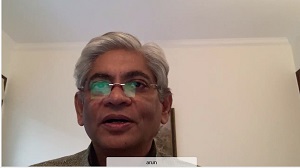To discuss the trends in Indo-US relations and the potential trajectory of the bilateral partnership, the Vivekananda International Foundation organised a virtual Vimarsh on 29 October. The opening remarks were made by the VIF director Dr. Arvind Gupta. A detailed presentation on the theme was made by career diplomat Amb. Arun K Singh who has previously served as the Indian ambassador in the US, France and Israel. He is currently a member of the National Security Advisory Board (NSAB) as well as a distinguished fellow at VIF.
Trends in Indo-US Relations
The Indo-US relations have gone through various phases of highs and lows but have grown tremendously regardless in the last two decades. Over the years, the bilateral relationship has transformed from being transactional and uncertain to becoming a global, comprehensive strategic partnership suited for twenty-first century.
Recent trends in the partnership are promising and carry great scope for widening of the relationship further. The Trump administration was quite articulate about building ties with India and the new Biden administration has continued with the same approach by reiterating the US commitment to further deepening the India-US ties. Prime Minister Narendra Modi’s recent visit to Washington and his meetings with President Joe Biden has set the tone for bilateral relations in the next few years. The two leaders also attended first in person Quadrilateral Dialogue (Quad) leaders’ summit. The growing bilateral cooperation along with multilateral cooperation such as the Quad is likely to be an important trendsetter in the new world order.
There is also a bipartisan consensus in the US Congress on building strategic ties with India. Likewise, India has also been advocating for astronger partnership with the US. The changing international environment has played a major role in shaping thisdynamic. The US sees India as a partner in its regional and global agenda. Similarly, India sees the US as an importantpartner in in its economic and scientific development as well as in its security calculus.
Conclusion
India must seize the opportunity of intensifying ties with the US. As pointed out earlier, there is a strong and growing support for strong relations with India in the US Congress and the administrationin general irrespective of the party in power. In addition, this support goes beyond politics to include the business community and other stakeholders who are looking for a reliable business alternative to China. The large Indian Diaspora has also played its own role in strengthening the ties.
While furthering the cooperation, however, both sides need to be realistic in their expectations from each other. It is important to understand that foreign policy objectives and priorities or even business interests may not always coincide. However, these differences need not be blown out of proportion. Rather, a mechanism to navigate differences and work through areas of cooperation need to be prioritised on both sides. In this respect, the US must give space to India to take decisions on its own interests as the latter cannot support all US foreign policy decisions. Likewise, India needs to evaluate US decisions given that the domestic compulsions would continue to shape its foreign policy decisions.
To conclude, the period ahead carries several opportunities for building India-US ties. At a time when Beijing has emerged as a main economic, security and military challenger, a strong Indo-Us partnership could play a catalytic role in balancing China.





Post new comment